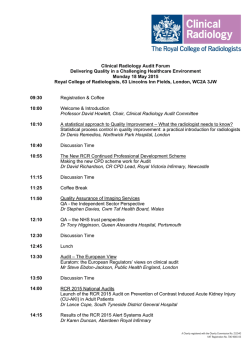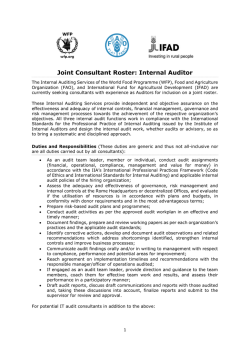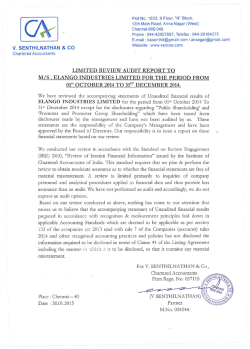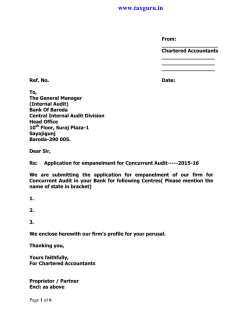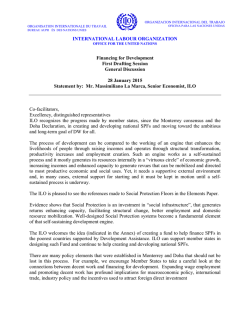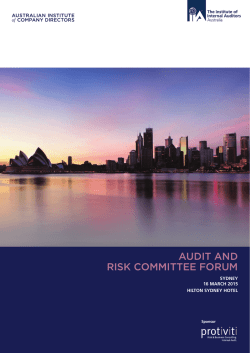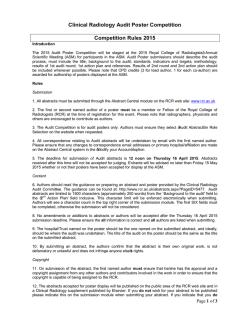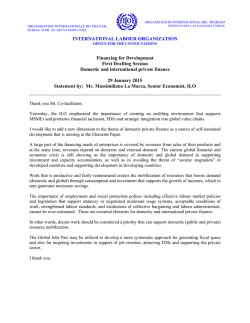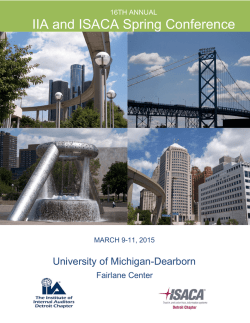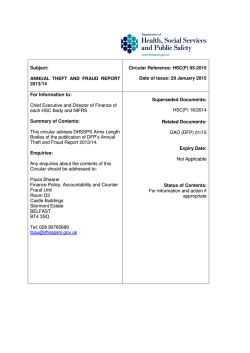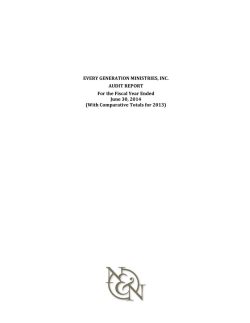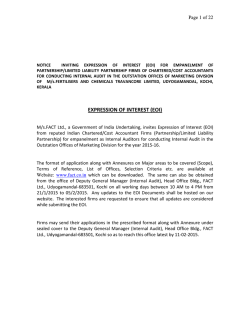
External audit plan - International Labour Organization
INTERNATIONAL LABOUR OFFICE Governing Body 323rd Session, Geneva, 12–27 March 2015 Programme, Financial and Administrative Section GB.323/PFA/INF/2 PFA FOR INFORMATION External audit plan Summary: In this paper, the Director-General transmits to the Governing Body a summary of the External Auditor’s annual audit plan for the year ending 31 December 2014, for information. Author unit: External Auditor. Related documents: None. This document will be made available in printed form during the GB session only, in order to minimize the environmental impact of the ILO's activities and processes, contribute to climate neutrality and improve efficiency. All GB documents are available on the Internet at www.ilo.org. GB.323/PFA/INF/2 International Labour Organization Summary annual audit plan to the Governing Body for the year ending 31 December 2014 Our mandate The consolidated financial statements of the International Labour Organization are subject to an annual audit in accordance with article 35 of the Financial Regulations of the International Labour Office. The Auditor General of Canada is the auditor of the International Labour Organization (ILO) following appointment by the Governing Body, for a period of four years commencing on 1 April 2008, in accordance with Chapter IX of the Financial Regulations. Our mandate was extended for an additional four years until completion of the 31 December 2015 consolidated financial statement audit at the 310th Session of the Governing Body. Scope of our audit Our audit objectives Our primary responsibility is to form and express an opinion on the consolidated financial statements based on an audit. The consolidated financial statements are prepared by management with the oversight of those charged with governance. An audit of the financial statements does not relieve management or those charged with governance of their responsibilities. We will conduct our audit in accordance with International Standards on Auditing (ISA). Those standards require that we comply with ethical requirements and plan and perform the audit to obtain reasonable, but not absolute assurance, on whether the consolidated financial statements are free of material misstatement, including those misstatements caused by fraud or error. We also assess the ILO’s compliance with significant authority instruments and consider whether, during the course of our examination, we have become aware of any “other matters” that, in our opinion, should be brought to the attention of the Governing Body. The objectives of the annual audit are to provide an independent opinion on whether: ■ the consolidated financial statements present fairly, in all material respects, the financial position of the International Labour Organization and its controlled entity, the International Training Centre, as at 31 December 2014, and the results of their financial performance, their cash flows and the comparisons of budget to actual amounts for the year then ended in accordance with International Public Sector Accounting Standards (IPSAS); ■ the accounting principles have been applied on a basis consistent with that of the preceding year; and ■ the transactions that have come to our notice during the audit of the consolidated financial statements have, in all significant respects, been in accordance with the Financial Regulations and legislative authority. GB323-PFA_INF_2_[FINAN-141217-1]-En.docx 1 GB.323/PFA/INF/2 Our deliverables At the conclusion of the audit, we will provide the following reports to the Governing Body: ■ Independent auditor’s report. ■ Long-form report. This will contain our findings with respect to the efficiency of the financial procedures, the accounting system, financial controls and, in general, the administration and management of the ILO, and all matters referred to in article 6 of the appendix to the Financial Regulations. In addition to our reports, we expect to provide the following additional information: ■ Report to the Director-General – Audit results. This report is prepared to assist the Director-General in his review of the consolidated financial statements. This report is also presented to the Independent Oversight Advisory Committee (IOAC). ■ Management letter. A derivative communication that identifies opportunities for changes in procedures that would improve systems of internal control, streamline operations, and/or enhance financial reporting practices. ■ Management report to the Staff Health Insurance Fund (SHIF) Management Committee. Based on the additional audit work carried out on the revenues and expenditures as well as the other assets and liabilities of the SHIF, a management report will be issued to communicate the results of the work undertaken as well as any significant issues encountered during the audit. Responsibilities Auditor responsibilities We are responsible to conduct our audit in accordance with International Standards on Auditing. Those standards require that we comply with ethical and independence requirements, and that we plan and perform the audit to obtain reasonable assurance about whether the consolidated financial statements are free from material misstatement. An audit involves performing procedures to obtain audit evidence about the amounts and disclosures in the consolidated financial statements. The procedures selected depend on the auditor’s judgement, including the assessment of the risks of material misstatement of the consolidated financial statements, whether due to fraud or error. An audit also involves evaluating the appropriateness of the accounting policies used and the reasonableness of the accounting estimates made by management, as well as evaluating the overall presentation of the consolidated financial statements. The scope of our audit will include obtaining, to the extent necessary to effectively carry out our work, an understanding of the ILO and its business environment, the business risks it faces, how the ILO manages those risks, and its overall control environment. Risk assessment. In making our risk assessments, we will obtain an understanding of internal control relevant to the preparation of the consolidated financial statements in order to design audit procedures that are appropriate in the circumstances. The scope of our review of internal controls will not be sufficient to express an opinion on the effectiveness or efficiency of your internal controls. However, we will inform management, as well as 2 GB323-PFA_INF_2_[FINAN-141217-1]-En.docx GB.323/PFA/INF/2 those charged with governance, in writing of any significant deficiencies in internal control relevant to the audit of the consolidated financial statements that we have identified during the audit. Because of the inherent limitations of an audit, together with the inherent limitations of internal control, there is an unavoidable risk that some material misstatements in the consolidated financial statements may not be detected (particularly intentional misstatements concealed through collusion), even though the audit is properly planned and performed in accordance with International Standards on Auditing. Fraud. In planning and conducting the audit, we consider the possibility that fraud or error, if sufficiently material, may affect our opinion on the consolidated financial statements. Accordingly, we maintain an attitude of professional scepticism throughout the audit, recognizing the possibility that a material misstatement due to fraud could exist. Because of the nature of fraud, which could include attempts at concealment through collusion and forgery, an audit designed and executed in accordance with International Standards on Auditing may not detect a material fraud. Furthermore, while effective internal control reduces the likelihood that misstatements will occur and remain undetected, it does not eliminate that possibility. For these reasons, we cannot guarantee that fraud, error, and illegal acts, if present, will be detected. Communication of matters. We will inform management and, if appropriate or necessary, those charged with governance of the following matters that we may have identified during the course of our audit: ■ misstatements, resulting from error (other than trivial errors), and the request to correct those misstatements; ■ fraud or any information obtained that indicates that a fraud may exist; ■ any evidence obtained that indicates non-compliance, or suspected non-compliance, with the ILO and ITC Financial Regulations and legislative authority; ■ significant deficiencies in the design or implementation of internal control to prevent and detect fraud or error; and ■ related party transactions identified by us that are significant and outside the normal course of operations. However, audits do not usually identify all matters that may be of interest to management in carrying out its responsibilities. The type and significance of the matter to be communicated will determine the level of management to whom the communication is directed. Management responsibilities Our audit will be conducted on the premise that management acknowledge and understand that they have the following responsibilities. Responsibility for consolidated financial statements and internal control. Management is responsible for the preparation and fair presentation of the consolidated financial statements and information referred to above. It is also responsible for establishing and maintaining an effective system of internal control over financial reporting to enable the preparation of consolidated financial statements that are free from material misstatement, whether due to fraud or error. In this regard, management is GB323-PFA_INF_2_[FINAN-141217-1]-En.docx 3 GB.323/PFA/INF/2 responsible for establishing policies and procedures that ensure financial information is prepared in accordance with International Public Sector Accounting Standards. Correction of errors. Management is responsible for adjusting the consolidated financial statements to correct material misstatements and for confirming to us that the total of all uncorrected misstatements identified by us during our audit are immaterial, both individually and in total, to the consolidated financial statements taken as a whole. In addition, we expect management will correct all known non-trivial errors. Prevention and detection of fraud. Management is also responsible for the design and implementation of programs and controls to prevent and detect fraud, and for informing us: (a) of the risk that the consolidated financial statements may be materially misstated as a result of fraud; (b) about all known or suspected fraud affecting you involving: (i) management; (ii) employees who have significant roles in internal control over financial reporting; and (iii) others where the fraud could have a non-trivial effect on the consolidated financial statements; and (c) of its knowledge of any allegations of fraud or suspected fraud affecting the entity received in communications from employees, former employees, analysts, regulators, or others. Related parties. Management is responsible for disclosing to us the identity of each related party as defined by: ■ International Standard on Auditing 550 – Related Parties. ■ International Public Sector Accounting Standard 20 – Related party disclosures. and all the related party relationships and transactions of which it is aware and for providing to us any updates that occur during the course of this engagement. Subsequent events. Management is responsible for informing us of subsequent events that may affect the consolidated financial statements of which it may become aware up to the date the consolidated financial statements are issued. Laws, regulations and other authorities. Management is responsible for identifying and ensuring that it complies with the laws, regulations and other authorities applicable to the Organization and its activities. Management will make available to us information relating to any illegal or possibly illegal acts, and all facts related thereto, and will provide information to us relating to any known or probable instances of non-compliance with the Financial Regulations and legislative authority of the ILO and ITC, including financial reporting requirements. Providing information on a timely basis. Management is responsible for making available to us, on a timely basis, all of your original accounting records and related information relevant to the preparation of the consolidated financial statements, additional information that we may request for the purposes of our audit, and unrestricted access to personnel who we may determine necessary to obtain evidence necessary to support our audit of the consolidated financial statements. Management representation letter. Management will provide us with written representations that encompass representations made to us during the audit covering the 4 GB323-PFA_INF_2_[FINAN-141217-1]-En.docx GB.323/PFA/INF/2 consolidated financial statements. Management’s representations are integral to our audit evidence. Our audit approach Overview Our audit approach is designed to allow us to execute a good quality and efficient audit. We do this by: (a) gaining an understanding of the ILO and its environment by focusing on new developments and key business issues affecting the Organization, as well as management’s monitoring of controls and business processes; (b) identifying significant audit risks, sharing our perspectives, obtaining your feedback, and ensuring our audit is tailored to these risks; (c) reviewing the work of: (i) the actuary, hired by the ILO, to determine its AfterService Health Insurance (ASHI) and repatriation grant liabilities and assessing the reasonableness of management’s assumptions used in the calculations; (ii) the independent valuator used to determine the fair value of land and buildings; and (iii) the fund managers’ reports on the fair value of investments; (d) using well-reasoned professional judgement, especially in areas that are subjective or that require estimates; and (e) leveraging reliance where possible on the ILO’s internal controls, information technology and data systems. Our approach will include a mixture of substantive analytics, and detailed testing. Our understanding of the ILO also drives our assessment of materiality and the identification of audit risks. Risk analysis We have identified the following audit risks and other risks, including business risks with a potential audit impact, as part of our planning process. Risk area(s) (including key judgements and estimates) Management’s controls Our audit approach Due to the economic difficulties in various countries, the ILO member States may have difficulties in settling their assessed contributions due on the first of each year. This could result in significant decrease in collection thus impacting the level of the provision recorded by management with regards to assessed contributions, and results could vary significantly. Management communicates regularly with member States throughout the year. Formal assessment letters are distributed annually; updated statuses of assessments are communicated following all receipts of contributions; further status reports are distributed when a member State is in arrears and risks losing the right to vote. We will review the calculations of the provision and the assumptions made by management to ensure that the provision is sufficient. We will also review subsequent receipts in order to assess the reasonability of the provision. The level of voluntary contributions received by donors could also decrease and result in the ILO not Estimates of extra-budgetary expenditure contained in the Director-General's programme and budget proposals are based on either We will review the voluntary contribution agreements and whether these meet the definition of GB323-PFA_INF_2_[FINAN-141217-1]-En.docx 5 GB.323/PFA/INF/2 6 Risk area(s) (including key judgements and estimates) Management’s controls Our audit approach being able to carry out certain activities and this could lead to the ILO not fully meeting its objectives. It could result in a significant decrease in the estimated value of the voluntary contributions receivable at year-end and the actual results could differ significantly from the estimates. already established letters of agreement with donors or pipeline projects considered sufficiently certain to warrant their inclusion. Amounts included in the Statement of Financial Position reflect signed agreements and amounts delivered and due from donors. an asset under IPSAS, as well as review the past history of payment by the donors to assess whether the amount receivable is collectable and reasonable. The renovation of the headquarters building is a unique project that requires new controls and monitoring. As a result, costs may not be properly accounted for. This could result in errors in the consolidated financial statements presentation as the accounting treatment can be complex. The disclosure of the construction contract commitments will have to be expanded when new contracts are signed. The commitment note’s disclosed figures could contain significant amounts to be paid out of future contributions. To address this risk, management has established separate accounting codes to ensure all such expenditures are separately recorded and accounted for accurately. Regular reporting to the Renovation Project Governance Board ensures expenditures are reviewed for correctness by management and at year-end a complete analysis is undertaken to ensure correct IPSAS disclosure. We will review the accounting treatment of the renovation costs to ensure compliance with IPSAS and management’s monitoring of the project. We will also examine the commitments to ensure completeness in their disclosure. Significant accounting estimates included in the financial statements: ■ accruals including employee benefits; ■ the fair value of land and buildings; and ■ fair value of investments including derivatives. Certain estimates are particularly sensitive due to their significance to the consolidated financial statements and the possibility that future events may differ significantly from management’s expectations. Management retains independent experts to value its liabilities relating to the ASHI and Repatriation Grant. Management also reviews in detail the information used to estimate other employee benefit accruals. An independent valuator is retained by the ILO to carry out a full review of the land and building fair values every three years and updates these for every year in between. The ILO obtains year-end reports on the fair value of its investments and derivatives from independent institutions and these are reviewed in detail to ensure that the figures provided are reasonable. We will ensure that management’s estimates are reasonable and supported by sufficient and adequate evidence. Where required, we will assess the competencies of management’s experts engaged in this capacity. We plan to engage our own external expert to help in the review of the assumptions made and the calculations of the ASHI and repatriation grant liabilities. Non-compliance with significant authority instruments (Financial Regulations and amendments, delegation of authorities or procurement rules). Non-compliant activities could impact the reputation of the ILO and its ability to deliver its programmes. Management has put in place processes with controls to ensure compliance to the regulations, rules and procedures. The Director-General, through the Treasurer and Financial Comptroller has established Financial Rules, Staff Regulations and internal governance documents to guide the activities of the ILO in support of the Regulations. As part of our audit work, we will ensure that all transactions that come to our notice are in compliance with the applicable significant authority instrument. In addition, we will assess overall compliance to the Financial Regulations. There is a risk of fraud in the Staff Health Insurance Fund transactions which could impact its ability to remain financially viable. Management has put in place processes of reporting fraud, investigation mechanisms as well as the Accountability Committee who reviews the results of the investigations and recommends to the Director-General a course of action. The Accountability Committee also annually publishes a report on the most significant fraud cases and what action was taken by management. This is published on the Intranet and accessible by all staff. As part of our audit work of SHIF, we will assess management’s controls to ensure that these address fraud risks. We will also ensure that the SHIF transactions comply with the approved policies. GB323-PFA_INF_2_[FINAN-141217-1]-En.docx GB.323/PFA/INF/2 Materiality Materiality represents our judgement on the degree of significance of a misstatement(s) that could influence the decision of a knowledgeable user relying on the financial statements. In determining materiality, both quantitative and qualitative factors are considered. Consistent with prior year we have set our preliminary materiality at 2 per cent of planned expenditures, or $13.4 million. Our materiality calculation is based on current forecasted results; should there be a significant change, we will communicate changes to the Director-General at year-end. Other work to be performed in 2014 ■ Staff Health Insurance Fund – This audit work will include reviewing the revenues and expenditures of SHIF, any significant asset or liability recorded at year-end, as well as ensuring compliance to the SHIF Regulations with regards to the Guarantee Fund. ■ Performance audit work: Travel – This audit work will include reviewing ILO changes to improve travel management and harmonize travel arrangements with other United Nations organizations. ■ Performance audit work: Regional visit – This audit work will include reviewing of business processes and IT implementation in two ILO regions to assess appropriateness of processes, controls and the efficient use of resources. ■ Governance follow-up work on 2012 long-form report – This audit work will include following up on management’s implementation of recommendations made in the 2012 long-form report relating to the headquarters building renovations project and information technology projects. ■ Contribution audit work – This audit work will include audits of various United States Department of Labor-funded projects. Independence Our Office’s Code of Values, Ethics and Professional Conduct, the Financial Administration Act and the Rules of Professional Conduct of the Chartered Professional Accountants of Canada and the International Federation of Accountants’ (IFAC) Code of Ethics for Professional Accountants require us to maintain independence from the International Labour Organization. At this time, we are not aware of any relationships between the International Labour Organization and our audit staff that, in our professional judgement, may reasonably be thought to bear on our independence. Office of the Auditor General of Canada Geneva, 28 January 2015 GB323-PFA_INF_2_[FINAN-141217-1]-En.docx 7
© Copyright 2026
